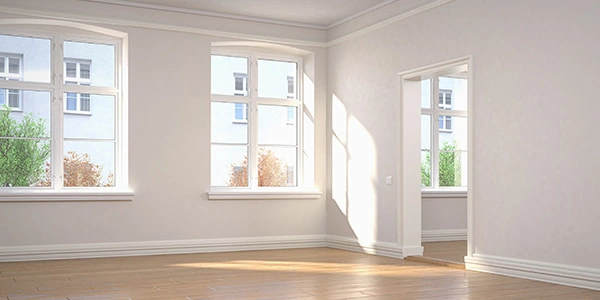What is Unoccupied Property Insurance?
Unoccupied property insurance is a type of insurance policy that is designed to protect properties that are empty for an extended period of time. A property is considered unoccupied when it has been empty for more than 30 days.
Properties that are unoccupied are at higher risk of fire, water damage, vandalism or squatting due to no one being present to resolve or deter these issues quickly. As such, insurance for unoccupied properties takes into account these risks.
Standard home or landlords insurance does not cover properties left empty for an extended period of time.
How our process works
We’ve worked hard to refine our process and keep it as quick, easy and simple as possible for our customers.
Who Needs Insurance For An Unoccupied Property?
Unoccupied property insurance is typically required by property owners who plan to leave their property vacant or unoccupied for more than 30 days.
Some common scenarios where unoccupied property insurance may be necessary include:
- Property undergoing renovations: If you are renovating your property and plan to move out during the renovations, your property may be considered unoccupied and you may need unoccupied property insurance.
- Property for sale: If you are trying to sell your property and it remains empty for an extended period, you may need unoccupied property insurance.
- Property awaiting probate: If a property owner has passed away and the property is awaiting probate, it may be considered unoccupied and you may need unoccupied property insurance.
- Second homes or holiday homes: If you own a second home or holiday home that remains empty for an extended period, you may need unoccupied property insurance.
If your property is left unoccupied without the proper insurance, you may be at risk of being denied a claim in the event of needing to.
When Is A Property Classed As Unoccupied?
A property is generally classed as unoccupied when left empty for more than 30 days. This means the property has no furniture and is not lived in for the set time frame.
Some insurers may class a property to be unoccupied much sooner. For instance, they may consider the property vacant at 21 days so it is important to check policy wording.
When a home owner takes and extended holiday, it is unlikely that the insurer will class the property unoccupied in this instance but it is worth checking your home insurance policy for this.
What Does Unoccupied Property Insurance Cover?
Insurance for empty properties typically covers a range of risks that are associated with leaving a property empty for an extended period of time. The specific cover provided may vary depending on the policy and insurance provider but typically includes the following:
What Doesn’t Unoccupied Property Insurance Cover?
While vacant property insurance is designed to cover a range of risks associated with leaving a property empty for an extended period of time, there are some limitations to what it covers. Here are some common exclusions to unoccupied property insurance coverage:
It’s important to carefully review the terms and conditions of any unoccupied property insurance policy you are considering to understand exactly what is and isn’t covered. If you have any questions about what is covered, you should speak with an insurance broker who specialises in unoccupied properties.
Do I Need To Inform My Insurer If My Property Is Unoccupied?
If you are a home owner and intend to be away for longer than 30 days, it is likely that you will be required to notify your insurer. Most insurance providers will offer you a bolt on short term unoccupied home insurance policy.
If the property is to be vacant through renovation for instance, then a completely separate specialist unoccupied property policy will be required.
By informing your insurance provider that your property is going to be unoccupied, you can ensure that you have the appropriate insurance cover in place. In the event you need to make a claim and you have not notified your insurer, it is probable that your claim will be rejected.


